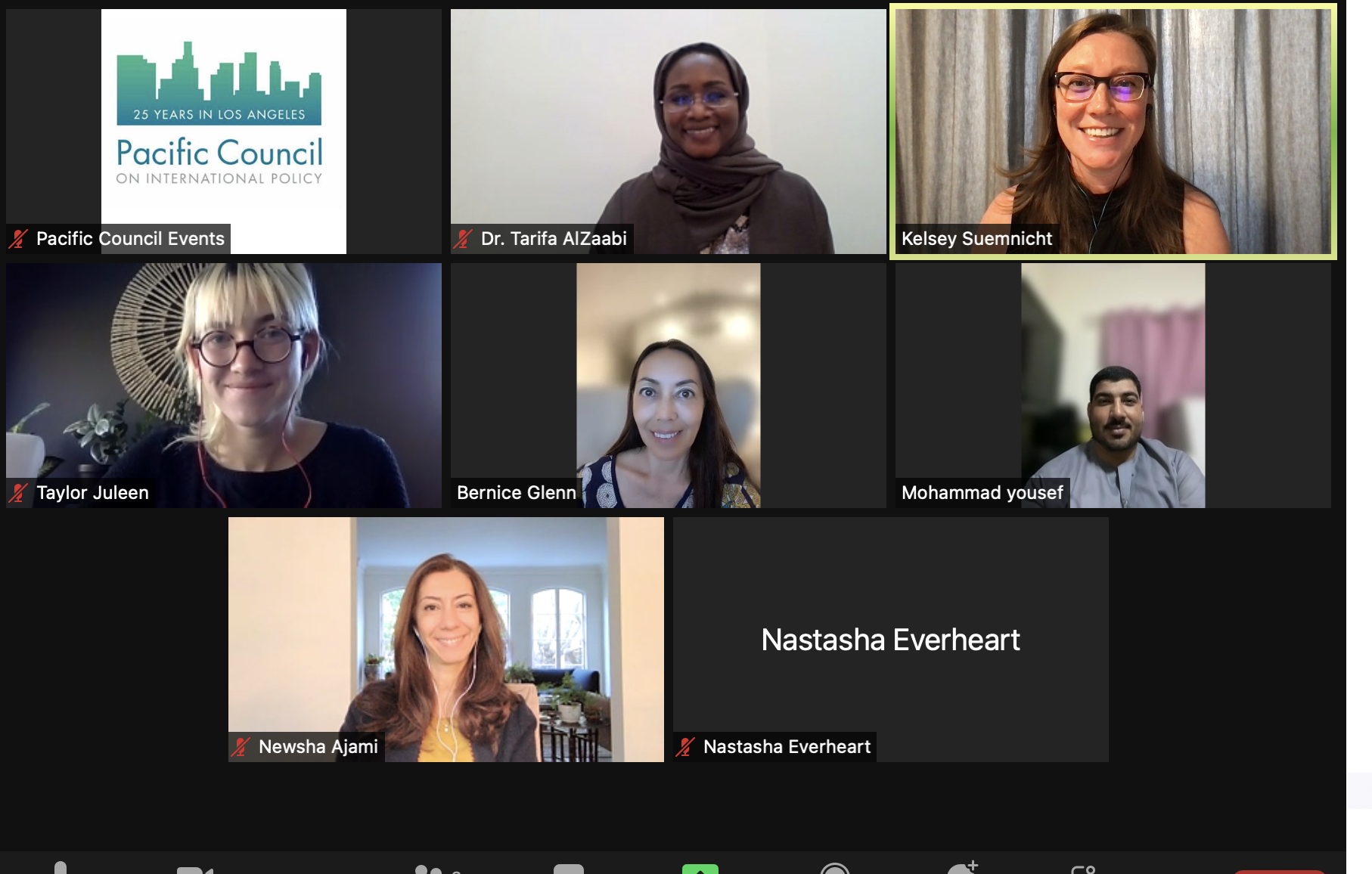Los Angeles & The United Arab Emirates: City Diplomacy for the Future of Food & Water Security
Photo credit: Jermaine Ee; Grand Central Market, Los Angeles, CA
BY Kelsey Suemnicht
In October 2021, we assembled a group of industry leaders from across the United Arab Emirates, California, and Hawai‘i to discuss this crucial question: as the global population continues to grow, what can cities in both developed and developing countries do to meet the increasing needs of water and food in a way that is sustainable and equitable?
Below are five major ideas that emerged in our round table discussion hosted in partnership with the United Arab Emirates Consulate General in Los Angeles. Thank you to these leading voices who recommended these areas of focus for the future of food and water security:
Dr. Tarifa Al Zaabi, Acting Director General, International Center for Biosaline Agriculture
Dr. Newsha Ajami, Director of Urban Water Policy, Water in the West, Stanford University
Bernice Glenn, Senior Advisor, National Security Technology Accelerator
Taylor Juleen, Food Policy Fellow at County of Los Angeles Department of Public Works.
Awareness is a key issue; people are disconnected from the resources that support our everyday lives.
Among end-users and consumers, there is low awareness of the levels of the amount of waste that happens in the supply chain, both prior to consumption and after. More data can be collected and distributed to illustrate what consumption and waste trends are emerging. When trends can be clearly communicated, especially in real-time, then it can be motivation for behavior change. From soil health and quality, to water, to food, to waste– all trends need to be measured, tracked, and managed in a smarter way.
The way we use water needs to change.
Particularly in Los Angeles, we are using our ground very quickly without giving the supply a chance to recharge. Food and water are connected issues; the majority of California water usage is dedicated to food production. We can start to rely on alternative sources of water, like the way the United Arab Emirates is exploring harvesting fog and promoting biodiverse crops that can be irrigated with saline water. To be included in the dialogue is the water needed to support livestock; to create grass and feed for animals we can embrace the use of treated wastewater as an alternative. Additionally, there is a correlation between growing population and poverty, and there must be a financial willingness to invest in vulnerable communities whose access to steady food and water is already being denied.
Virtual Round Table Discussion, October 2021 with Dr. Tarifa Al Zaabi, Kelsey Suemnicht, Taylor Juleen, Bernice Glenn, Mohammad Yousef, Newsha Ajami, and Nastasha Everheart
Efficient supply chains exist and need to be implemented.
When the COVID-19 pandemic hit, it further illustrated the gaps in our current supply chain processes and exhibited how slow many supply chains are. It created a pattern where farmers didn’t know what to do with products when their regular connection to stores was interrupted, due to safety concerns. The pandemic provides an opportunity to review current practices and add value to our food cycle by implementing a circular economy, a production/consumption model that emphasizes sustainable growth.
The implementation of local and/or indigenous practices is missing from many discussions on best practices and the future of resource security.
Indigenous practices previously created unprecedented stability for resource use, practices that involved the lowest levels of water usage, but yielded the highest nutritional value crop. To create a stable future, we can learn from examples that work and study success stories to determine what can be duplicated in our current practices.
There is a disconnect between policies and the speed at which they need to be implemented.
In diagnosing policy needs for food and water management, the timeline is much slower than needed and synergy is missing between discovery and action. Subject matter experts have come up with solutions, tested and are ready to be utilized, but often bureaucratic barriers present immense challenges to actually implement much-needed change. Existing systems and policies don’t support change and haven’t been designed to accommodate new ideas. In carving out more spaces for interdisciplinary conversations so we can do a better job at creating robust solutions.
The Global City Fellowship Program, under the leadership of the Pacific Council on International Policy, advocates for city diplomacy in the public sphere, develops Los Angeles’ role as a leader on international issues, and forges strong ties between Angelenos and their counterparts in international cities. The Pacific Council seeks to inspire a culture of global engagement from our home city in Los Angeles, and applies a local-to-global lens on everything we do. We strive to help people who live and work in their local communities understand how their movements, choices, and local policies have global impact.
Recommended Reading from the Pacific Council:
Keeping the Desert Green: Telecommunication & Water in Dubai by Brian Chase
Another Example of the Environmental Crisis: Biodiversity Loss in the 21st Century by Madalin Catalin Blidaru
Additional Resources:
Water Use in California (Public Policy Institute of California, May 2019) by Ellen Hanak and Jeffrey Mount
To Feed the World, the US and the United Arab Emirates Should Partner on Climate Action by Dan Glickman
Editorial: No, L.A. is not a desert. But we are getting there - Los Angeles Times
________________________________________________
Kelsey Suemnicht is is the inaugural Global City Fellow. Suemnicht is a public affairs professional who has worked as a contracted Digital Engagement Manager at the U.S. Department of State, Media Analyst at the Organization for Security and Co-operation in Europe (OSCE), and Editorial Researcher at Foreign Policy Magazine. She holds a Masters in Public Diplomacy from the University of Southern California.
Find out more about our Global City Fellowship Program here.
The views and opinions expressed here are those of the author and do not necessarily reflect the official policy or position of the Pacific Council.

